1899: Boer War
November 9, 2021
By AHNZ
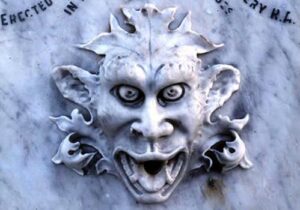 The South African Republic (1852) became an enemy of New Zealand and we fought the Boer War against them from October 1899 to May 1902. They were fighting for their home and their identity with everything they had, men women and children. Our victory involved deporting their fighting men to Bermuda, St. Helena, and British India. The women and children we rounded up in Concentration Camps for re-education. Their stock we killed. Their farms we burned, their earth we scorched and salted. Were we the good guys?
The South African Republic (1852) became an enemy of New Zealand and we fought the Boer War against them from October 1899 to May 1902. They were fighting for their home and their identity with everything they had, men women and children. Our victory involved deporting their fighting men to Bermuda, St. Helena, and British India. The women and children we rounded up in Concentration Camps for re-education. Their stock we killed. Their farms we burned, their earth we scorched and salted. Were we the good guys?
This memorial gargoyle (image, left) in Albert Park, Auckland, doesn’t suggest so. Or, on the other hand, did those Boers get what was coming to them?
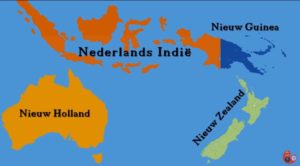 Just 200 years before the Dutchman was king of the world. He discovered and named places like Nieuw Zeeland (that’s us), New Holland (Australia,) Van Diemen’s Land (Tasmania,) New Guinea, and the Dutch East Indies. After their star had fallen we took their stuff. But the established ethnic group living at Cape Colony did not wish to be British. Rather than make a fuss, they started The Great Trek overland to find again their place to stand; What the Maoris call ‘mana whenua.’
Just 200 years before the Dutchman was king of the world. He discovered and named places like Nieuw Zeeland (that’s us), New Holland (Australia,) Van Diemen’s Land (Tasmania,) New Guinea, and the Dutch East Indies. After their star had fallen we took their stuff. But the established ethnic group living at Cape Colony did not wish to be British. Rather than make a fuss, they started The Great Trek overland to find again their place to stand; What the Maoris call ‘mana whenua.’
In the same era that our Canterbury Pilgrims sought to set up an Anglican colony and the Otago Settlers a Presbyterian one, The South African Republic was for the equally religious Afrikaners.
Wakefield settlements in New Zealand included seperate colonies for Anglicans, Methodists, High Anglicans, Scottish Presbyterians, Irish Catholics, and Jewish Zionists. Only the last 2 were not realised. So, we New Zealanders can hardly be absolved from being totally in support of a people who wants their own place to live in their own way.
“At first the British government refused to admit that the trekkers had ceased to be British subjects; but at length it was forced to see that they had passed out of its control.” – Our Nation’s Story (c.1940)
During New Zealand’s own gold rush in the 1860s all manner of people flooded in to our country. Hundreds of thousands of diggers came but we didn’t let them run our country. Certainly not. Chinese and Irish, Italians and rude Germans? No! When the South African Republic had their gold rush in the 1880s the were swarmed with outlander diggers too. ‘Uitlanders’, they were known as.
“The Free Church of Scotland was established to get away from state control. They were sick of being told what to do by the British. Founding Dunedin was part of that plan but it went to bits when it turned out they were on the edge of a gold field….The Celtic Puritan town was well inconvenienced. As a consolation, they did become wealthy and were able to build great infrastructure. The spiritual project was substituted for a temporal one.” – 1955: Dunedin Inclined to Vanity, AHNZ
“Non-combatants would have been rounded up before their farm was scorched and sent to prisoner camps. More than 30,000 farms like this one were burnt out. To win the war we New Zealanders made life hell for the South Africans so that they’d give in…” – 1901: Shoot the Boer; AHNZ
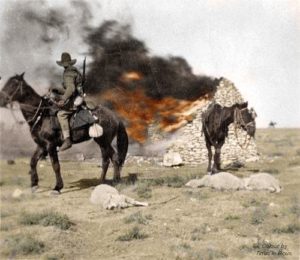
The South African Republic was established to get away from British state control. They were sick of being told what to do and wanted to keep to themselves. However, it turned out they were living on the edge of a gold field. As a consolation they did become wealthy and were able to build great infrastructure. The City of Gold, Johannesburg, became their version of our Dunedin or Hokitika.
New Zealand had swelled by the riches and infrastructure, the tax take, that the international diggers brought in. South Africa now did the same by letting diggers freely prospect and mine the hard rock but the Afrikaner farmers did not let the numerous extractive visitors take civic control from them. That seems fair enough. New Zealand didn’t permit that either.
South Africa’s British neighbors, meanwhile, looked on jealously as the people they had kicked out of the nest prospered in their new gold and diamond-encrusted land. I’m reading a 1940s primary school text book (Standard 6) called Our Nation’s Story for a New Zealand point of view that justify what happens next. Tries to. “The Outlanders complained that they were compelled to pay taxes but were denied representation in the government which imposed those taxes. In reply the Boers argued, that, since the Outlanders had come as uninvited guests, they had no just grounds for complaint. If the Outlanders did not like living under Boer rule, said the Boers, they might stay away from the Transvaal.”
The Prime Minister of Cape Colony at this time, the 1890s, was Cecil Rhodes. Just 30 years before the role had been filled by New Zealand’s own management staff of George Grey and Robert Wynyard. Rhodes backed an 1895 rebellion, The Jameson Raid, within South Africa which failed and cost him his office. It made South Africa stronger and resolute in resisting the muscle Britain was throwing around. Their President Paul Kruger “..refused to give way, and continued to abuse and insult the Outlanders…British garrisons at the Cape and in Natal were strengthened. Kruger then sent an insulting message from Pretoria, in which he threatened that if the reinforcements were not at once withdrawn, he would declare war within twenty-four hours.” The British had no intention of reversing their troop surge and so began the war.
The primary school history version goes on to say that Britain won and offers a chapter heading “A Generous Gift” as South Africa was made British against its will. The best excuses it offers are that Kruger was an “insulting” and “abusive” man but does that justify Concentration Camps, genocide, scorched earth total war? New Zealand even sent a troop of women after the fighting to re-educate the surviving Concentration Camp Afrikaners in how to be what they now were: British Citizens. It was total hegemony and hard to think diamonds and gold might not have played some part.
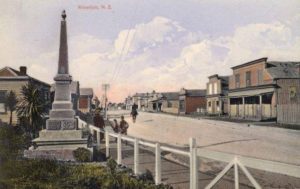 New Zealand had fought its first foreign war. We had parades, Khaki Girls, took trophies and raised many monuments (eg. Riverton, Hokitika, Patea,…) In fact, the Patea memorial lamp, 9 Nov 1900, was unusually placed long before the war was done*. Probably because some local had died and parents wanted to remember him but decided late to dedicate it to all of Patea’s lost sons to that point.
New Zealand had fought its first foreign war. We had parades, Khaki Girls, took trophies and raised many monuments (eg. Riverton, Hokitika, Patea,…) In fact, the Patea memorial lamp, 9 Nov 1900, was unusually placed long before the war was done*. Probably because some local had died and parents wanted to remember him but decided late to dedicate it to all of Patea’s lost sons to that point.
Allied to Cecil Rhodes, our Premier for the War was Richard Seddon. He had come to New Zealand on the same wave of gold-hunters that was now in South Africa, he had been an Outlander in this country at a time when diggers didn’t get votes. New Zealand didn’t get ‘One Man, One Vote‘ until 1889 and here they were willing to start a deadly war on South Africa in the 1890s because it hadn’t adopted the same political reform?
“‘Does anyone in his proper senses, anyone with the smallest atom of intelligence or fairmindedness really believe that but for the gold and diamond discoveries in South Africa the Boers would ever have been disturbed in their isolation?’” – Expelled Chief Hansard Reporter, James Grattan Grey; Ref. Robson (2021)
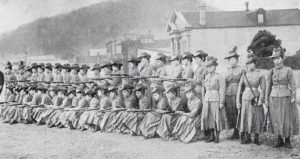
Are we the Baddies?
Seddon was very eager to make war and so were most New Zealanders. It was something of a mass hysteria as Nigel Robson explains very well in his talk at the National Library (5 May 2021.) Ref. Audio version of same. Was Seddon so carried away with Jingoism that he couldn’t see himself in President Paul Kruger? Whatever Kruger had said about his Outland Diggers Seddon and his Liberals must have outdone a hundred times while speaking and legislating discriminantly toward the Chinese!1
The South African War was one of the several times when New Zealand went collectively mad. Contentious Objectors were given a very rough time of it and buried their objections under dozens of monuments. New Zealand irrationality can sometimes be turned inwards on itself and no amount of appealing to reason us out of what we were never reasoned into in the first place. But then we only have ourselves to blame. The greatest injustice is when New Zealanders turn their irrationality outwards by, for example, destroying another nation. If some other country were to destroy New Zealand some day using such weak excuses as we’ve used in the past could we justly complain?
—
* “Early, but not quite the first: a plaque was unveiled in Otterbourne, Hampshire in June 1900 to SSM G Yonge Rhodesia Rgt who was killed 22-10-1899. Two memorials to Mjr-Genl Sir W Penn-Symons were unveiled in September and October 1900. On October 21 in the town of Buxton a plaque was unveiled to Sgt W Perkins 4th bn Derybshire Rgt killed 07-06-1900 at Roodewal.” – Meurig Jones, Facebook comment
1 Usually Seddon’s racism is being most loudly outraged against by people who don’t bother to detail any of it by so much as producing a quote to show it’s true
Image ref. Fanged gargoyle remembers the Boer War, monument at Albert Park, Auckland; Ref. NZ History.gov
Image ref. Colorised by Tinus le Roux; Boer War Colourised Photographs; Facebook
Image ref. The Khaki Girls, Greymouth; Lord (1928)
Ref. ‘Are we the Baddies?’ Mitchell and Webb Funny Nazi Scetch; Youtube
6 thoughts on "1899: Boer War"
Leave a Reply
 Like Comment Share
Like Comment Share






yOU MIGHT LIKE TO EXPLORE THE, oops, true relationship between the british and the Germans, Hitler vs Churchill.
1 was a great man, much aligned, the other was a drunken despot run by his handlers.
Who declared war on who?
‘Judea’ declared war on Germany, hence the need to round up dissidents etc, what country does not Inter enemy citizens?
The ‘gas chambers’ has been all but debunked, all on eastern bloc, all discovered after the war, despite red cross access
Ask me for my sources.
Thanks. New Zealand’s history is enough but The Anarchist History of The World can be a good follow-up project.
Thank you for saying it as it Is!
Very welcome. Looking forward to writing about the Third Boer War in the near future.
My grandfather lost his wife and 2 children in a concentration camp and my grandma lost het mother and all her siblings in the same camp. She was orphaned as her father was killed in the war. After the war my grandfather came to fetch his family, found only his daughter and with her in the tent another daughter of 13. The two took care of each other. My grandfather took the 13 year old orphaned girl, Maria to family and he went with his daughter to his farm. Some 5 years later he was forced to seek refuge on a farm for a sleepover due to a flooded river. The family was with whom he left Maria now 18 years. They fell in love and got married. Together they had 10 children! What was a tragic situation become a wonder story. My grandmother often told us her experiences in the concentration camp. It was horrific. One could never imagined women and children were treated that bad by the British soldiers. The abuse was terrible. Hope the New Zealand soldiers were not involved.
Our men burned your farms. Our women re-educated your concentration camp kids. If it’s any consolation it helped New Zealand work out its national identity and domestic problems a bit. Sorry for making your ancestors collateral damage.